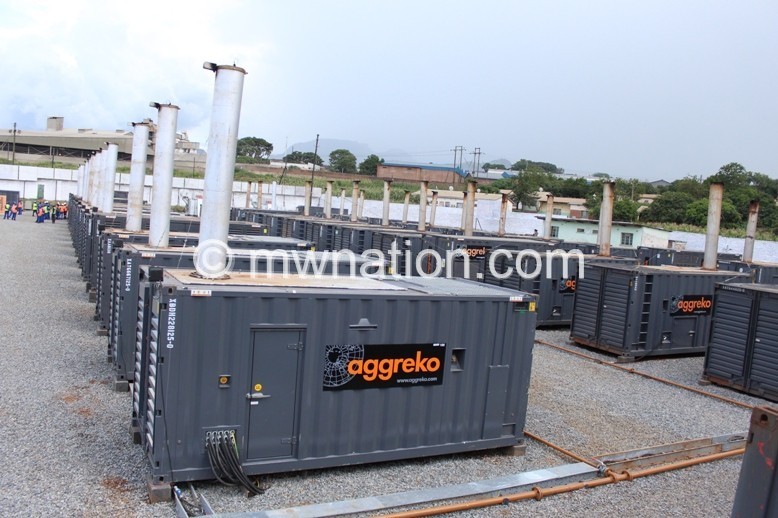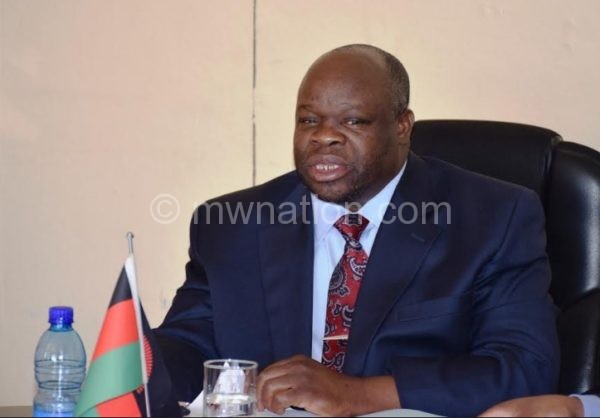Government to renew gensets deal
The Minister of Natural Resources, Energy and Mines Bintony Kutsaira says government will renew the Aggreko Power Solutions Limited diesel-powered generators contract at its expiry in January 2020 because the 78-megawatts (MW) capacity gensets have stabilised power supply.
But energy and consumer rights experts have cautioned government to thoroughly scrutinise the decision to renew the contract, saying the arrangement should have been a temporary measure because power generation by diesel is not sustainable.

While confirming that using diesel powered generators was expensive than hydro, Kutsaira said looking at Malawi’s current power challenges, government has no option but to continue with the generators option.
He said: “Government thinks it is better to have expensive power than having none at all. Shire River is not getting adequate water and all hydro power generators are not operating to their full capacity.
“All the hydro generators are producing less than 200 megawatts [against the installed generation capacity of 351MW] and we are now surviving on 78 megawatts from diesel generators.”

To hammer the point home, the minister cited the week when truck drivers staged a strike, saying the power outage was prolonged because the diesel for generators could not have been delivered.
Kutsaira said the generators could be offloaded in a year’s time if Malawi finalises the Zambia-Malawi interconnection whose funding China has committed.
“We have secured $30 million funding from China to connect Chipata [in Zambia] and Nkhoma [in Lilongwe]. This deal will bring 80 megawatts which we will replace the 78 megawatts diesel powered generators with,” he said.
Currently, Malawi imports 20MW power from Zambia.
In 2017, Electricity Supply Corporation of Malawi (Escom) leased 84 gensets from Aggreko to produce 78MW for six hours each day, contributing about 10 percent of power to the national grid. However, since the dwindling of water levels in Shire River the generators are now the main source of power.
A copy of emergency power tariff impact analysis done in November 2017 shows that generation cost of a unit of energy using diesel powered generators was K195 ($0.26) per kilowatt hour (kWh) while Escom was selling the electricity to consumers at K84.40 kWh, making a loss of about K 110.6.
In contrast, generation cost of a unit of energy using hydro generation was K19.68 kWh and sold at K84.40 kWh to cover the cost of diesel-powered generation.
Reacting to the decision to renew the gensets contract, Consumers Association of Malawi (Cama) executive director John Kapito said the generators might have helped cushion Malawians from prolonged outages that hit over 20 hours a day, but it would be better to review the contract renewal at a public forum.
He said: “I would have also loved to look at key performance indicators that were agreed with Aggreko. What was it that we expected Aggreko to do and what have they done?
“Maybe we needed to have Mera [Malawi Energy Regulatory Authority] as an independent regulatory body to help us appreciate what the gensets have done to this country.”
Besides, Kapito said the other important aspect is to also consider the public perception of the gensets as it matters a lot in decision making.
Energy expert Grain Malunga said use of the diesel gensets should have been a temporary solution as power generation by diesel is not sustainable.
“This should have been a temporary solution while we sort out hydro power or thermal power generation. You can come up with a 90 MW hydropower plant.
“We are always making flawed decisions. We need to make decisions that have business sense not short-term gains,” he said.
In an earlier interview, Ministry of Natural Resources, Energy and Mines spokesperson Sangwani Phiri told The Nation that apart from the diesel powered generators, government has established other inflow of electricity supply bought from Zambia Electricity Supply Company (Zesco) through Chipata, Mwami Mchinji corridor up to Lilongwe and another inflow from Mozambique’s EDM Company through Phombeya to Nkhoma Substation to cater much for the Central and Northern regions.
“All this is to be achieved by government through the Southern Africa Power Pool agreements while government is also looking into yet other alternative sources like through the Malawi-Tanzania Electricity supply agreement on co-generation of electricity on Songwe River by bridging it and putting up electricity generating machinery in it with funding from the World Bank,” he said.
In 2017, Mera approved Escom’s proposal to increase electricity tariffs from K58.74 to K72.85 per kWh to cover the cost of generators.
Escom’s tariff impact analysis, dated November 17 2017, shows that at the end of two years, the power utility was to spend over K105.5 billion paying Aggreko Power Solutions Limited, yet Malawians will have used 90 percent of power generated through hydro.
On the other hand, Escom is expected to sell 153.6 million units of the diesel-generated energy—with a 16 percent system loss—to the consumers at a retail price of K72.56 per kWh to get the same K32.6 billion and an added K490.4 million as administrative charge.





